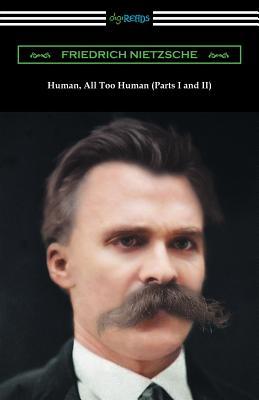"Human, All-Too-Human (Parts I and II)" is a collection of philosophical aphorisms by famed philosopher Friedrich Nietzsche. The first part, originally published in 1878, is a collection of 638 aphorisms in which Nietzsche discusses metaphysics, the Christian idea of good and evil, religious worship, the idea of divine inspiration in art, social Darwinism, the respective roles of men, women, and children in society, the power of the state, and in a final section "Man Alone with Himself". In the second part we find what were originally published as parts II (1879) and III (1880), which contains 408 and 350 aphorisms respectively. Friedrich Nietzsche is widely regarded as one the most important philosophers of all time and that impact is ever apparent in this book, an accessible volume of thoughts upon social, religious, cultural, political, and psychological issues. Part I follows the translation of Helen Zimmern with an introduction by J. M. Kennedy. Part II is translated with an introduction by Paul V. Cohn. This edition is printed on premium acid-free paper.

"Human, All-Too-Human (Parts I and II)" is a collection of philosophical aphorisms by famed philosopher Friedrich Nietzsche. The first part, originally published in 1878, is a collection of 638 aphorisms in which Nietzsche discusses metaphysics, the Christian idea of good and evil, religious worship, the idea of divine inspiration in art, social Darwinism, the respective roles of men, women, and children in society, the power of the state, and in a final section "Man Alone with Himself". In the second part we find what were originally published as parts II (1879) and III (1880), which contains 408 and 350 aphorisms respectively. Friedrich Nietzsche is widely regarded as one the most important philosophers of all time and that impact is ever apparent in this book, an accessible volume of thoughts upon social, religious, cultural, political, and psychological issues. Part I follows the translation of Helen Zimmern with an introduction by J. M. Kennedy. Part II is translated with an introduction by Paul V. Cohn. This edition is printed on premium acid-free paper.